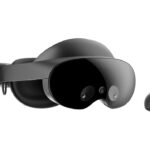In recent news, Meta has made the rather significant announcement that it will be making their headset operating system available to headsets other than Quest. Calling it Meta Horizon OS, this is actually a virtual reality shell that runs atop Android. I find this interesting since Android itself is a mobile shell running above the Linux kernel. This isn’t to diminish anything, since there’s an enormous amount of effort that goes into not just the coding, but equally important, creating an experience that exposes a virtual reality environment to the user.
In making it open to “third-party hardware makers,” we may well start to see other standalone headset makers (Pico? HTC? Pimax?) sporting the same user interface. Asus, Lenovo, and Microsoft (Xbox) are called out in the press release as first adopters. This might sound familiar of course. Microsoft did something similar with their Windows Mixed Reality platform. They had a strong stable of device manufacturers lined up from the start, but the offerings dropped off quickly. The big difference there was no first-party hardware offering (ignore the HoloLens) and the fact that Meta has proven their platform before offering it up.
Are more choices always better?
While some will lament the monoculture and diminished choice here (similar to Chrome/Chromium slowly becoming the only web browser core), it has some pretty strong benefits. At this point, Meta has put a huge number of resources into creating a virtual reality OS that works well for a broad range of people and applications. It only makes sense to try to offset their costs through licensing. From the user point of view, this means less learning to get used to with a new headset. From the manufacturer’s point of view, they can bring their headset to market quicker and jump right onboard the Meta train to gain customers quicker.
The bigger point here, beyond the user interface and look-and-feel, is the fact that this means the Quest Store (soon the Meta Horizon Store) will now work on even more devices. This is where the real value comes in. For end-users, this means they can safely buy a new headset without worrying about losing out on new titles (or support drying up completely after a year or two). Even a smaller company’s device will gain access to the huge catalog. I could well imagine Meta extending Meta Quest+, their monthly membership, to these new customers for even more market penetration. For developers though, it will now be possible to target that many more devices with little extra work.
Write once, test often
Of course, software developers know that just because lots of devices will be able to run the same OS, doesn’t mean that it’s truly free. We’ve finally gotten there with Android for phones. Regardless of who makes the phone, apps generally work. Not that long ago, this wasn’t always the case. Many devices sounded great but meant more testing. I expect this to be the case for some time now as there’s still so much innovation to do in the headset space. Whether it’s updated sensors, entirely new display technology, or weird controllers, developers will need to consider a more varied landscape when they test things. I think this is a small price to pay though compared to supporting entirely different OS’s for each headset brand.
The other detail that was announced around the same time is that the App Lab will soon be shutting down to be incorporated into the main Quest Store. This is really awesome news. App Lab was the wild west of the store and allowed pretty much anything to be updated. This meant that small developers had a place to publish, but it also meant that users couldn’t search for the titles. That was a huge limitation. By allowing any app into the main store, it becomes more like the mobile app stores or Steam where you just have to expect a range of quality. App Lab always had a great variety of really strong apps alongside the other ones. They’ll now have a better chance of being seen.
The App Lab change is likely an important concession as part of opening up the platform more. By playing gatekeeper to the store in such a strong way, licensees might well balk at the perceived power being retained. This way, everyone is on more equal footing.
Coming soon…
No dates were provided in the press release other than “announced today” back on April 22, but the changes will likely be visible pretty soon. Given the somewhat recent release of Valve’s Steam Link and Xbox Cloud Gaming (Beta) as standalone apps on the Quest platform, it’s clear that Meta is playing for keeps and they recognize that they can’t do it alone. This should give any current Quest headset owners confidence that their investment will continue to be a good one into the future, and prospective buyers will know they are making the right choice.
Source: Introducing Our Open Mixed Reality Ecosystem | Meta (fb.com)





